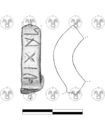IT-8 potsherd: Difference between revisions
Sindy Kluge (talk | contribs) No edit summary |
No edit summary |
||
| (6 intermediate revisions by 3 users not shown) | |||
| Line 3: | Line 3: | ||
|type=Henkelbecher | |type=Henkelbecher | ||
|material=pottery | |material=pottery | ||
|dimension=length 4. | |dimension=length: 4.6 cm, diameter: 1.3 cm | ||
|dimension_max=4.6 cm | |||
|condition=fragmentary | |condition=fragmentary | ||
|culture_archaeological=La Tène A | |culture_archaeological=La Tène A | ||
| Line 11: | Line 12: | ||
|find_context=fairground | |find_context=fairground | ||
|find_circumstances=excavation | |find_circumstances=excavation | ||
|coordinate_n=47. | |coordinate_n=47.118563 | ||
|coordinate_e=10. | |coordinate_e=10.666984 | ||
|sortdate_find=1996 | |sortdate_find=1996 | ||
|location=Archäologisches Museum Fliess | |location=Archäologisches Museum Fliess | ||
|inventory_number=Pi 293/96/1 | |inventory_number=Pi 293/96/1 | ||
|accessibility=on exhibition | |accessibility=on exhibition | ||
|checklevel=0 | |checklevel=0 | ||
}} | }} | ||
== Commentary == | == Commentary == | ||
Published in {{bib|Tschurtschenthaler & Wein 1998}}: 247; {{bib|Tschurtschenthaler & Wein 2002}}: 664. Examined by TIR in July 2014. | |||
Image in {{bib|Tschurtschenthaler & Wein 1998}}: 249, fig. 24 (photo). | |||
The fragment is most probably the handle of a ceramic vessel type Henkelbecher. It is a typical find from the Pillerhöhe insofar as Henkelbecher are a large find group there, and usually the only sizeable fragments of the intentionally destroyed beakers are the comparatively thick handles ({{bib|Tschurtschenthaler & Wein 2002}}: 663). Cylindrical cross section. Fine clay, from brown to dark grey in colour, moderately tempered with fine-grained sand and cast gold as well as argentine mica; reduction firing; burnished. | |||
The handle, found in 1996 during the annual excavations on the Pillerhöhe, was discovered in the area of the fairground near the burnt-offerings site. Like the major part of the object offerings on the Pillerhöhe, the handle does not have burn marks and can be considered a deposit offering, even if the place of discovery does not necessarily correspond to the place of deposit. See [[index::Pillerhöhe]] for more information about the archaeological context. The dating to the early La Tène period is based upon the fact that the larger part of the Pillerhöhe ceramics consists in early Fritzens-Sanzeno pottery; see {{bib|Tschurtschenthaler & Wein 1998}}: 247 and {{bib|Tschurtschenthaler & Wein 2002}}: 663f. for details about the ceramic finds from the Pillerhöhe. | |||
{{bibliography}} | {{bibliography}} | ||
Latest revision as of 16:42, 3 April 2020
| Object | |
|---|---|
| Classification: | handle |
| Archaeological type: | Henkelbecher |
| Material: | pottery |
| Size: | length: 4.6 cm, diameter: 1.3 cm |
| Condition: | fragmentary |
| Archaeological culture: | La Tène A |
|
| |
| Site: | Fliess (Tirol, Austria) |
| Field name: | Pillerhöhe |
| Archaeological context: | fairground |
| Coordinates (approx.): | 47° 7' 6.83" N, 10° 40' 1.14" E |
| Find date: | 1996 |
| Find circumstances: | excavation |
| Current location: | Archäologisches Museum Fliess (on exhibition) |
| Inventory Nr.: | Pi 293/96/1 |
|
| |
| Inscription: | IT-8 (piθan[) |
Images
|
Object IT-8 potsherd with inscription IT-8.
|
Object IT-8 potsherd with inscription IT-8.
|
Commentary
Published in Tschurtschenthaler & Wein 1998: 247; Tschurtschenthaler & Wein 2002: 664. Examined by TIR in July 2014.
Image in Tschurtschenthaler & Wein 1998: 249, fig. 24 (photo).
The fragment is most probably the handle of a ceramic vessel type Henkelbecher. It is a typical find from the Pillerhöhe insofar as Henkelbecher are a large find group there, and usually the only sizeable fragments of the intentionally destroyed beakers are the comparatively thick handles (Tschurtschenthaler & Wein 2002: 663). Cylindrical cross section. Fine clay, from brown to dark grey in colour, moderately tempered with fine-grained sand and cast gold as well as argentine mica; reduction firing; burnished.
The handle, found in 1996 during the annual excavations on the Pillerhöhe, was discovered in the area of the fairground near the burnt-offerings site. Like the major part of the object offerings on the Pillerhöhe, the handle does not have burn marks and can be considered a deposit offering, even if the place of discovery does not necessarily correspond to the place of deposit. See Pillerhöhe for more information about the archaeological context. The dating to the early La Tène period is based upon the fact that the larger part of the Pillerhöhe ceramics consists in early Fritzens-Sanzeno pottery; see Tschurtschenthaler & Wein 1998: 247 and Tschurtschenthaler & Wein 2002: 663f. for details about the ceramic finds from the Pillerhöhe.

